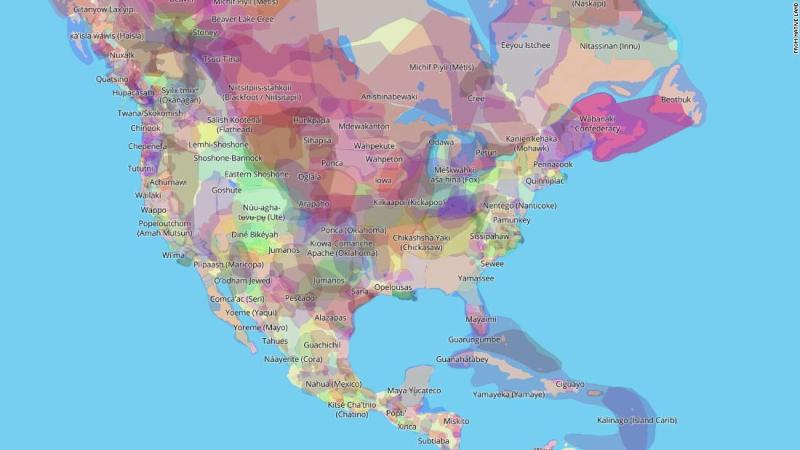This app will show you what Indigenous land you're on
By: Leah Asmelash (MSN)



As the US grapples with history and becomes increasingly racially and culturally aware -- with ethnic studies curriculums in schools, recognition of the dangers of White supremacy, and growing social justice movements -- more people are acknowledging the keepers of the land now known as North America: Native Americans.

 © from Native Land Native Land Digital, a Canadian nonprofit, runs a website where users can easily type in their addresses and see what nations their land belonged to.
© from Native Land Native Land Digital, a Canadian nonprofit, runs a website where users can easily type in their addresses and see what nations their land belonged to.
Land acknowledgments are a way for non-Indigenous people to honor and pay respect to the Indigenous people who lived and took care of the land before the arrival of White Europeans, who often used violence to take control of the lands while forcing survivors onto reservations. The acknowledgments are becoming increasingly common, with even the Macy's Thanksgiving Day Parade taking part.
And now, there are apps that will easily tell you whose land you're on.
One of the most popular ones is run by Native Land Digital, a Canadian non-profit. The organization has a website and app where users can enter an address and see which Indigenous nations lived on that land.
Though the map doesn't represent the official or legal boundaries of the nations, it's an interesting look into the history of the land the users may call home. And the map links out to multiple websites about Indigenous tribes and nations, their languages, or any relevant treaties -- essentially providing users with an education about their homes.
"Native Land Digital creates spaces where non-Indigenous people can be invited and challenged to learn more about the lands they inhabit, the history of those lands, and how to actively be part of a better future going forward together," the website states.
"What we are mapping is more than just a flat picture. The land itself is sacred, and it is not easy to draw lines that divide it up into chunks that delineate who 'owns' different parts of land. In reality, we know that the land is not something to be exploited and 'owned', but something to be honoured and treasured. However, because of the complexities of history, the kind of mapping we undertake is an important exercise, insofar as it brings an awareness of the real lived history of Indigenous peoples and nations in a long era of colonialism."
But if using the map is too cumbersome, one bot on Facebook will tell you what land you're on if you message it your city and state. The bot, called Land Acknowledgment and made by Code for Anchorage, uses data from Native Land Digital.
But land acknowledgements are just a starting point, says Native Governance Center, a Native-led non-profit.
The center lays out a few concrete ways to support Indigenous communities on its website:
- Support Indigenous organizations
- Support Indigenous-led grassroots change movements and campaigns.
- Commit to returning land.

 Article is LOCKED by moderator [Split Personality]
Article is LOCKED by moderator [Split Personality]





Native-Land.ca | Our home on native land (native-land.ca)
Enter your zip code and see what tribe was there.
Toggle the maps to see which native languages dominated where.
And not to be forgotten, Toggle lists all of the US_ Indian "treaties" (Cessions ) almost 700 of them.
cool, I got to answer a question that has been bothering me for 50 years.
Canadian internet must be down - no contact.
Must have just gone down. I was there about an hour ago.
Error 522
Ray ID: 63449b748e841eba • 2021-03-23 03:35:00 UTC
Connection timed out
Still nope.
I just checked and had one time out error on firefox but it loaded (slowly ) on Edge.
Got it - and wished I hadn't . Spent 'bout an hour looking at who's what where why and three hours reviewing some of the cessations/treaties of my Nation (Chickasaw). Seriously, some good stuff. Kappler has an extensive listing/collection of treaties between the U.S. and Indian Tribes/Nations, but being able to click on a link based on the Land's data is a helluva lot quicker that trying to research Kappler.
. Spent 'bout an hour looking at who's what where why and three hours reviewing some of the cessations/treaties of my Nation (Chickasaw). Seriously, some good stuff. Kappler has an extensive listing/collection of treaties between the U.S. and Indian Tribes/Nations, but being able to click on a link based on the Land's data is a helluva lot quicker that trying to research Kappler.
Thanks SP - got this "Bookmarked".
I saw it and knew it would be a great resource.
Link isn't working, SP.
It did when I looked.
I clicked on the seeded content bar. no problem.
It had a lot of layers to it.
I think it was more of a generalization as it doesn't really mention any small tribes that have been.
I just checked and it took several minutes to load. very deep layered site
Interesting map. Read a little at the link for Native Governance Center. I'm a little vague on what the hoped for goal is.
reparations. get the deeds to the church and pastor's residence ready. which tribe should be notified? /s
Mine said Choctaw.
What I figured.
What is still.
Here comes my semi-unpopular take, likely to offend someone. Oh well.
To that extent, I think this is a great kind of resource. Very interesting. Assuming some level of accuracy, it could be a valuable historical tool, or even just entertaining for laypeople.
I already know whose land I’m on. It’s mine.
Yeah, not very nice. Unfortunately, it’s the kind of thing that human beings have done to each other for many thousands of years. It’s also something we know native Americans did to other native Americas. Let’s not pretend there is something unique about the violent European conquest of North America. Lets also not pretend that native peoples were some kind of morally superior breed of people who never went to war with their neighbors and never pushed other people off of land they wanted.
Ok, then you don’t get to say that land was stolen from you, taken from you, or that you were pushed off of “your land.” And it’s ridiculous to characterize the apps as saying they show non-native people whose land they are really on. If you don’t believe in ownership rights for land, then it was never “yours” to begin with.
Yeah right! That’s never going to happen. Stop dreaming and try living in the real world.
That’s never going to happen. Stop dreaming and try living in the real world.
No problem with that.
That was unnecessary.
Did you see that there were 689 "Cessions"? Treaties with the US that were most likely broken or unenforced.
Treaties still being challenged in courts today.
So they may not necessarily want your taco "shell" but there might be a ton of unincorporated land to go argue about.
Consider it a gift.
Yep, the United States government repeatedly dealt in bad faith with the Indians. Sucks.
A waste of time in my opinion. A bunch of people who allegedly never believed in private property or land ownership generally are now arguing in court that certain land “belongs” to them. Do you not see how hypocritical and absurd that is?
And let’s be honest. Much of it is the shittiest, most useless land on the continent. The kind of places hardly anyone would ever choose to live. And to what end? The casino business? Not even 21st natives want to go back to living the kind of life their ancestors lived. I can go all over the world, looking back far into history and identify land my ancestors used to live on. That doesn’t mean the current government or people in those places owes me something.
You can hold on to ancient traditions and memories and still live like modern people. Everyone else manages to do it.
Speaking of which, the map shows that somehow natives occupied where I am, no they didn't unless they were of the mosquito tribe for it was a swamp later drained by 1900. The only thing we found around here was a Clovis point most likely transported here by a wounded animal that made it's way into the swamp during the winter.
Sure, they can claim anything about land use going back centuries. Who is going to disprove it?
I see every square inch of North America has some group assigned to it. What are the chances that that’s valid? Swamps in Florida or Louisiana. Mountain tops in Colorado or California. People were living there? Really? I feel like somebody is overdoing it just a little.]
Yeah, and those things are about 13,000 years old. I wonder who is supposed to represent those people? These maps make it seem like the various tribes existed in only one place. Or, if they moved over time, then they should be associated with all the land they ever lived on. Imagine the chaos if anyone tried this approach with Europe, Asia, and Africa.
Obviously you did not go to the website which indeed, lists tribes in all of South America, North America, Australia, New Zealand, Northern Europe and Northeast Russia.
That’s not the point. I’m sorry you didn’t understand.
I'm also sorry you are taking it personally like they are coming to take your home back.
That isn't the point of the seed.
I sorry you don't understand too.
Well, Suprise! You’re wrong. I don’t take it personally. It’s so dumb and impacts me not at all, so how could I take it personally? I must be hitting pretty close to the mark for you to think so, though.
All I am doing is expressing my common sense opinion that flies in the face of a bunch emotional, irrational nonsense.
SCOTUS ruled in 1823 in the "Marshall Trilogies" that the lands the Native Americans were on were theirs under "aboriginal title", meaning they've owned/lived/possessed the lands since the beginning of time.
The 'Marshall Trilogy' is a set of three 19th century Supreme Court decisions that affirmed the legal standing of Indian Nations.
Johnson v M'Intosh, 21 US (8 Wheat) 543 (1823) held that that private citizens could not purchase lands from Native Americans - the land is inalienable. This decision lays the foundations of the doctrine of aboriginal title in the United States,
Cherokee Nation v Georgia, 30 US (5 Pet) 1 (1831) held that Indian Nations were not "foreign nations" with respect to the United States, but 'domestic dependent nation[s]'.
Worcester v Georgia, 31 US (6 Pet) 515 (1832) is most famous for its dicta, which laid out the relationship between tribes and the state and federal governments by stating that the Federal Government was the sole authority to deal with Indian nations - at 561 the Court held that 'The whole intercourse between the United States and this nation [the Cherokee Nation], is, by our constitution and laws, vested in the government of the United States'. In this case, the Court held that the Cherokee Nation was sovereign, and Georgia had no rights to enforce state laws in this sovereign territory. The decision is credited as having built the foundations of the doctrine of tribal sovereignty in the United States.
But, unfortunately, treaties just got in the way of peaceful existence, so the U.S. just decided to take all lands, regardless of who owned/resided/possessed them and for how long.
It's not irrational emotional nonsense to the survivors of the North American genocide.
Too bad you don't have the compassion or the common sense to keep quiet about it when commenting with
so many of NT's Native Indian members making comments here.
Good to remember
That’s ok because there aren’t any survivors. There are descendants of survivors. Anyone alive today who thinks they are a survivor of American genocide probably is being irrational.
Compassion for what, exactly? That somebody was unjust to their ancestors? Get in line!
One of my grandmothers was Armenian. Believe me, I am well acquainted with genocide inflicted on someone I am related to. At least the United States acknowledges its own history. Turkey still lies and claims the Armenian genocide never happened. We don’t even get that minimal satisfaction.
A lot of people have interesting family histories. They just don’t go around being defined by that history a hundred years later or more. They find self esteem in the life they can live today, not in fighting a war their great great grandparents lost more than a century before they were born.
Much as I figured a mixture of Plains Cree and Metis
Hmm... imagine that... I live in the city of Wyandotte and it shows previously occupied by the Wyandot of Anderdon. I knew that already. There were Potawatomi, Odawa, and the occasional Ojibwa nations that intermingled here too. Especially during the War of 1812 when my family fought side by side with the Native Nations against the English.
I love the history of my local area. In the local high school [where my daughter is currently a senior], they have a class called Wyandotte History and my daughter is in that class. It's a fascinating class. My daughter is excited to go every day. Her teacher is impressed with her knowledge and personal family history here. I'm proud to say that I've helped teach her those things. I think that knowing local and personal / familial history is a good thing. While some may find terrible things that his / her family were a part of, they might find some great things too.